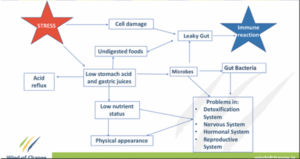IBS: THIS GUT CONDITION AFFECTS ONE IN 5 PEOPLE IN IRELAND
 20 Jun, 2018
20 Jun, 2018
So you’ve got Irritable Bowel Syndrome, and it’s making you anxious and stressed. Guess what? Certainly having IBS is naturally likely to create anxiety, and yet it is exactly this anxiety that then has the ability to take hold of the mind.
IBS is extremely common, affecting as many as one in five of our population. It is most common in people in their 20s and 30s and affects more women than men. In some people, irritable bowel syndrome is a mild discomfort, while in others it can have a hugely debilitating effect.
Here at Wind of Change, our team of Nutritional Therapists, follow the Functional Medicine approach. Practitioners take a whole new way of thinking about solving the puzzle of chronic symptoms and diseases. In Functional Medicine, we get to the disease’s root cause.
On this blog, we will explain how IBS provides a fantastic model for illustrating how Functional Medicine works. Even though it creates needless misery for millions of people, this condition is entirely fixable.
To be more specific, what is the cause of IBS? (1)
- Toxins
- Poor Diet
- Stress
- Allergens
- Microbes or gut imbalance (dysbiosis)
All of these can trigger symptoms and create thousands of diseases. So, what about those five people with irritable bowel? Each one of them may have different causes for the exact same symptoms.
Case Study. A 35 year old woman with longstanding “loose bowels” reports an increasing incidence over two years of painful abdominal cramps and “rumblings,” with frequent loose stools and occasional leakage. Her work is stressful, and she worries that her bowel problems may affect her job performance.
I had asked the client to test for coeliac disease, which was thankfully negative. I then recommended a stool test which showed Candida.
Advised to follow a strict FODMAP diet and the Candida protocol which includes supplements to help with healing. which lasted about four months. Once the ‘gut was healed’ a slow reintroduction of the different food groups was followed.
Relapses are possible, especially if a diet rich in refined carbohydrate, processed food along with a stressful lifestyle.
*The above advise is not intended for the general public: each protocol is individually created
What are the symptoms of IBS? (2)
Abdominal pain which can be quite severe – pain may be relieved following a bowel movement Unusual bowel movements – intermittent diarrhoea, constipation, or an alternating combination of both Crampy urge to move bowels but inability to do so Bloating sensation Excessive belching and flatulence Stool may have mucous and be small in size. Occasionally heartburn, nausea and vomiting also occur.
So, what can you do to get better? (3)
- Take digestive enzymes with meals. These help break down food while your gut heals. You may need these for two or three months, and many people benefit from taking them permanently.
- Remove sugary, processed foods. Besides wrecking your gut, these foods contribute to diabesity. Take an afternoon to hunt and gather all these foods in your kitchen and throw it all out. Be merciless. Then replace the fake food with real, whole, fresh foods.
- Eat an anti-inflammatory diet. Inflammation underlies IBS and many other gut conditions, so you’ll want to incorporate plenty of anti-inflammatory foods like fish into your diet. We also use herbs like quercetin and turmeric to reduce inflammation and heal leaky gutand other gut conditions that can contribute to or exacerbate IBS.
- Eat fermented foods. Include plenty of probiotic-rich foods like kimchi, kombucha, miso, or sauerkraut. Sometimes, you can also eat yogurt if you are not allergic to dairy. Try unsweetened sheep or goat yogurt. These are all foods that help your gut flora get and stay healthy.
- Exercise regularly. Randomized controlled trials show regular, consistent exercise reduces IBS. Even 30 minutes’ vigorous walking can help, and if you want something more intense, try high-intensity interval training (HIIT) or weight resistance.
- Reduce stress. If you struggle with IBS, you don’t need studies to tell you stress can exacerbate these symptoms. Regardless, such studies exist (4) Whether you employ yoga, meditation, deep breathing, or tapping, find something that works for you to control stress and do it regularly.
References:
- Irishhealth.com.(2018). Irritable bowel syndrome. [online] Available at: http://www.irishhealth.com/article.html?con=207 [Accessed 11 Jun. 2018].
- Hyman, M., FAQs, A., Minutes, M., Media, T. and Mark Hyman, M. (2018). This Gut Condition Affects One in Six People And is Entirely Treatable – Dr. Mark Hyman. [online] Dr. Mark Hyman. Available at: http://drhyman.com/blog/2015/04/09/this-gut-condition-affects-one-in-six-people-and-is-entirely-treatable/ [Accessed 11 Jun. 2018].
- Mark, H., FAQs, A., Minutes, M., Media, T. and Mark Hyman, M. (2018). Powerful Strategies to Eliminate IBS & Other Gut Issues – Dr. Mark Hyman. [online] Dr. Mark Hyman. Available at: http://drhyman.com/blog/2015/04/17/powerful-strategies-to-eliminate-ibs-other-gut-issues/ [Accessed 11 Jun. 2018].
- Qin, H. (2018). Impact of psychological stress on irritable bowel syndrome.

How Healthy are You?
Get a picture of your current health status and habits by taking our short Health and Wellbeing Check!